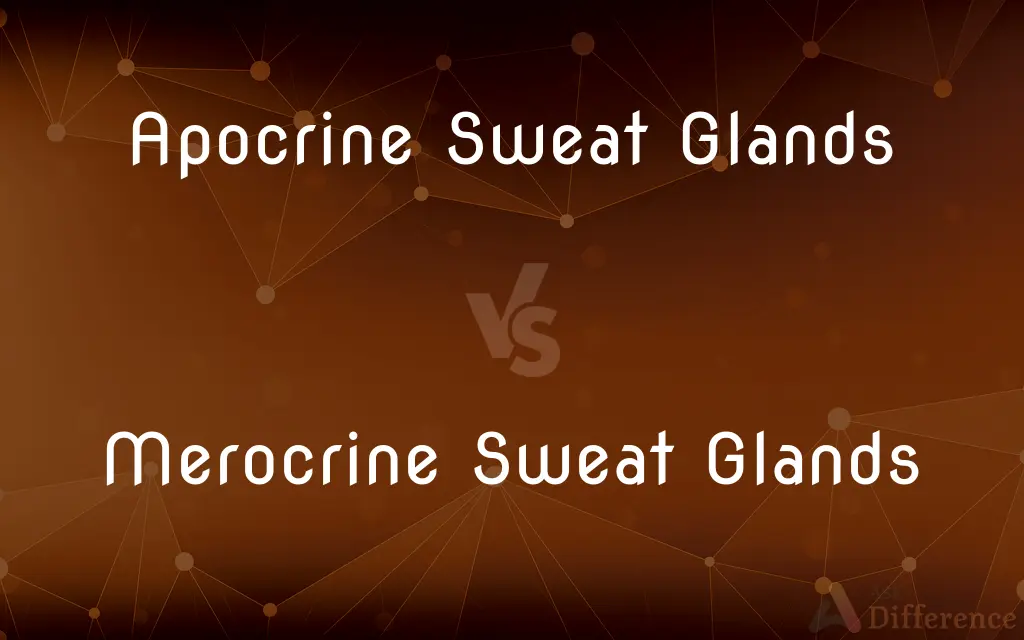Apocrine Sweat Glands vs. Merocrine Sweat Glands — What's the Difference?
By Fiza Rafique & Urooj Arif — Published on December 15, 2024
Apocrine sweat glands are associated with hair follicles in specific areas, secreting thicker fluid involved in stress and hormonal changes, whereas Merocrine sweat glands are widespread, producing thin, watery sweat for thermoregulation.

Difference Between Apocrine Sweat Glands and Merocrine Sweat Glands
Table of Contents
ADVERTISEMENT
Key Differences
Apocrine sweat glands, found mainly in the underarm and groin areas, become active during puberty. They release a thicker, milky sweat that, when broken down by skin bacteria, can cause body odor. These glands are stimulated by emotional stress or hormonal changes.
Merocrine sweat glands, also known as eccrine glands, are distributed throughout the body's skin. They play a key role in temperature regulation by producing a watery sweat that evaporates from the skin surface, cooling the body. These glands are active from birth.
The sweat produced by apocrine glands contains proteins and lipids, which contribute to its viscosity and potential for odor when metabolized by skin bacteria. This composition differs significantly from the watery, salt-rich secretion of merocrine glands, which is designed for efficient evaporation and cooling.
Merocrine glands are more numerous than apocrine glands and are found in high densities on the palms, soles, and forehead. Their distribution is related to their primary function of regulating body temperature, especially in response to heat and physical activity.
Both gland types release sweat, but the triggers for their activation differ. Apocrine sweat is primarily released in response to emotional stress, or hormonal changes, whereas merocrine sweat production is directly linked to body temperature regulation.
ADVERTISEMENT
Comparison Chart
Location
Underarms, groin, and areolar regions
Throughout the body, especially palms and soles
Activation
Puberty
Active from birth
Function
Stress and hormonal response
Thermoregulation
Sweat Composition
Thick, contains proteins and lipids
Thin, primarily water and salt
Response Trigger
Emotional stress, hormonal changes
Body temperature, physical activity
Compare with Definitions
Apocrine Sweat Glands
These glands become functional at puberty, contributing to adult body odor.
The activation of apocrine sweat glands at puberty introduces new personal hygiene considerations.
Merocrine Sweat Glands
High-density areas include the palms, soles, and forehead.
Sweaty palms during nervous moments are a result of active merocrine sweat glands.
Apocrine Sweat Glands
Apocrine glands secrete sweat in response to stress or arousal.
During a job interview, apocrine sweat glands may become more active.
Merocrine Sweat Glands
Merocrine glands are crucial for cooling the body through sweat evaporation.
During a run on a hot day, merocrine sweat glands work overtime to cool the body.
Apocrine Sweat Glands
The function of apocrine glands extends beyond cooling, playing roles in pheromone release.
Apocrine sweat glands are thought to contribute to individual scent signatures.
Merocrine Sweat Glands
Merocrine sweat is primarily composed of water and salts.
The salty taste of sweat is due to the electrolytes secreted by merocrine sweat glands.
Apocrine Sweat Glands
Located primarily in the underarm and groin areas, these glands are associated with body odor.
Apocrine sweat glands' activity can increase the need for antiperspirants.
Merocrine Sweat Glands
The sweat produced is watery and aids in thermoregulation.
The watery sweat from merocrine glands evaporates quickly, providing rapid cooling.
Apocrine Sweat Glands
Apocrine sweat is thicker due to its protein and lipid content.
The thicker sweat from apocrine glands is more likely to cause staining on clothes.
Merocrine Sweat Glands
These glands are active from birth and are found all over the body.
Merocrine sweat glands ensure efficient body temperature regulation even in newborns.
Common Curiosities
Do merocrine sweat glands produce body odor?
Merocrine sweat is less likely to produce odor since it is mainly water and salt, and doesn't provide the same bacterial growth environment as apocrine sweat.
Why do apocrine sweat glands cause body odor?
Body odor arises from the breakdown of apocrine sweat by skin bacteria, releasing odorous compounds.
Is sweating from apocrine glands the same as hyperhidrosis?
Hyperhidrosis is excessive sweating that can affect both apocrine and merocrine glands, but it's more commonly associated with overactive merocrine glands.
Can you stop sweating from apocrine glands?
While you can't completely stop sweating from apocrine glands, antiperspirants and hygiene practices can help manage odor and moisture.
How do you reduce activation of apocrine glands?
Stress management, proper hygiene, and the use of antiperspirants can help manage apocrine gland activation.
Why are merocrine sweat glands more active during physical activity?
They regulate body temperature by increasing sweat production for evaporative cooling during increased body heat from exercise.
Are there more merocrine than apocrine sweat glands?
Yes, the body has significantly more merocrine glands, which are distributed widely across the skin.
Can both gland types become blocked?
Yes, both types can become blocked, leading to conditions like heat rash or cysts, but proper hygiene can reduce the risk.
Can dehydration affect sweat production?
Yes, dehydration can reduce the ability to sweat, impairing body cooling and increasing the risk of heat-related illnesses.
Do animals have apocrine and merocrine sweat glands?
Many mammals have glands similar to human apocrine and merocrine glands, but their distribution and function can vary.
Does body hair affect the function of sweat glands?
Body hair can trap moisture and affect the evaporation rate of sweat, potentially influencing the cooling efficiency and odor development associated with apocrine sweat.
Is it bad to have active merocrine sweat glands?
Active merocrine glands are essential for body temperature regulation and are a sign of a healthy thermoregulatory system.
Do certain foods or drinks affect sweat gland activity?
Yes, spicy foods, caffeine, and alcohol can increase sweat production in some people.
Are there treatments to reduce excessive sweating?
Treatments include antiperspirants, Botox injections, prescription medications, and in severe cases, surgery.
Why do some people sweat more than others?
Sweat production varies due to factors like genetics, environment, fitness level, and health conditions.
Share Your Discovery

Previous Comparison
I-9 Form vs. W-9 Form
Next Comparison
Collagen Elastin vs. Reticular FibersAuthor Spotlight
Written by
Fiza RafiqueFiza Rafique is a skilled content writer at AskDifference.com, where she meticulously refines and enhances written pieces. Drawing from her vast editorial expertise, Fiza ensures clarity, accuracy, and precision in every article. Passionate about language, she continually seeks to elevate the quality of content for readers worldwide.
Co-written by
Urooj ArifUrooj is a skilled content writer at Ask Difference, known for her exceptional ability to simplify complex topics into engaging and informative content. With a passion for research and a flair for clear, concise writing, she consistently delivers articles that resonate with our diverse audience.













































